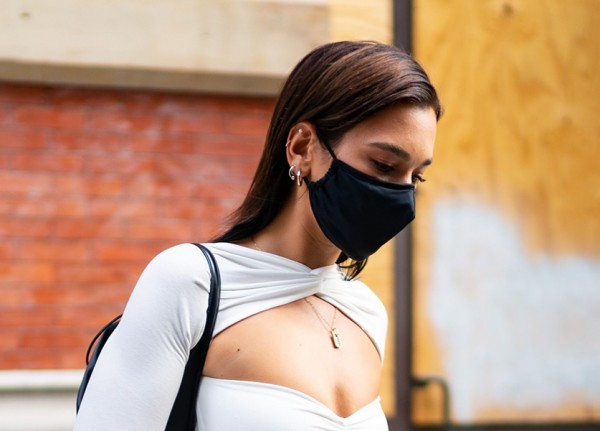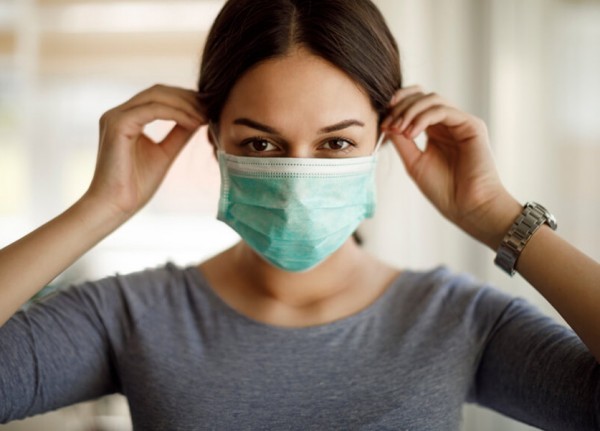LIFESTYLE
How the face mask is affecting our skin and our body
Specialists gave us all the possible solutions
Louis Ginie - Madame Figaro
8-October-2020

With masks being an all-day necessity, they don’t only disturb our essential habits, they also affect all our body and we are starting to see the results: Migraines, breathing difficulties, itching, pimples and others… Here are some explanations from specialists that will help us through this phase.
Since masks got mandatory in all companies and outdoors in some cities, you certainly noticed how your skin reacted: itching and pimples, the infamous maskne. With emphasis on the importance of wearing a protective mask during this period, health professionals explain how our body reacts to it and how it suffers from it (a little).
Pimples and itching
Wearing the mask for a long time puts constant pressure on the skin and prevents it from breathing. "Irritation, friction, bacterial proliferation due to the moist heat produced by breathing, are all consequences of this new habit that we have to adopt", told us Gautier Doat, doctor in the medical department of Ducray. Certain areas are particularly exposed, especially under the eyes, bridge of the nose, chin and back of the ears. "We are not talking here about allergies, but rather irritants" continues the doctor. Already existing pathologies such as acne or eczema can thus return amplified. Not to mention that stress and anxiety caused by the whole situation obviously play a role.
How de we limit these consequences? “When it’s time to change your mask (every 4 hours maximum) give your face an opportunity to breathe. You can also spray your face with thermal water and then let it dry well before putting the mask back on”, recommends Gautier Doat. The type of mask also weighs in the balance. "If they meet protection standards, cotton masks are best for reactive skin”.
Dry eyes
Some people may experience discomfort in their eyes.
"The face mask mainly causes dry eyes because the expiration of the air is concentrated upwards, and causes a regular flow of air towards the eyes", explains Damien Gatinel, ophthalmologist and head of department at the Rothschild Foundation Hospital in Paris.
This mainly affects people who already have a tendency to dry eyes, such as contact lens wearers.
The mask can also be responsible for secondary problems: allergies around the eyes (eczema, eyelid irritation) or bacterial infections. “During the day, people put the mask in their pocket, touch it and put it back on their face. All this facilitates the appearance of germs, and creates a gateway for infections such as conjunctivitis for example”. continues the doctor. Finally, when worn too high, the mask can also interfere with blinking.
How to solve this problem? The ophthalmologist recommends that the protection be firmly placed on our nose and cheeks, so that the air does not come out from the top but rather from the sides. "You can also put artificial tears in your eyes several times a day, to reduce the feeling of dryness".
Shortness in respiration
The mask obviously has an influence on the way we breathe the air in and out. "This protection forces us to breathe shallower than usual," explains Delphine Bihr, osteopath. The consequences are quite simple: you are out of breath much faster during an effort. “You can't take deep breaths, otherwise the mask will go in your mouth,” continues the professional. Recommendations are that you do not keep your mask on during intense physical exertion, when jogging or on a bike ride.
A stressed body
"Wearing the mask constantly reminds us of the pandemic and causes stress and anxiety." Says Delphine Bihr, osteopath. Even if the professional does not note a direct effect between wearing the mask and stress, she still recommends taking a few breaks during the day in order to take deep breaths at the window as soon as possible or to remove the mask when it’s possible at work.
Frequent headaches
For some of us, wearing a mask can cause "muscle headache tensions", indicates neurologist Dominique Valade, or tension in the skull. With the mask on your face, you force your facial muscles without necessarily realizing it, and you create tension that causes the headache. For people who already have migraines, these tensions can cause more regular attacks.
According to the doctor, there are hardly any solutions to get rid of these headaches. The best alternative would be to replace the mask with a visor. However, a mask is often mandatory and visors are seldom accepted.
Recommended

TRE, A New Homegrown Café in Dubai
9-April-2024




